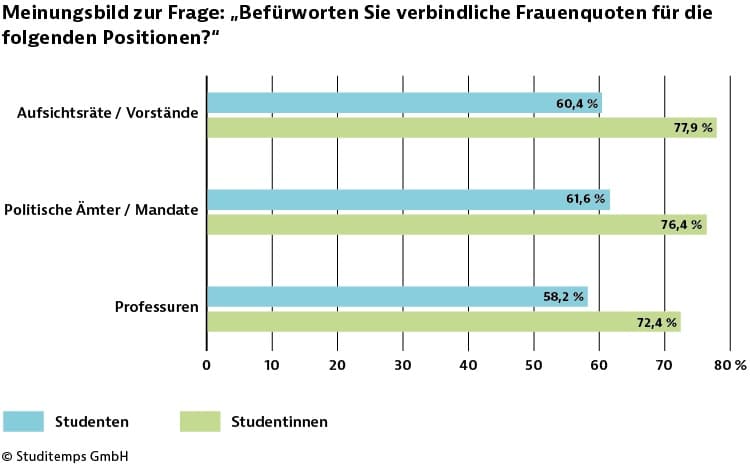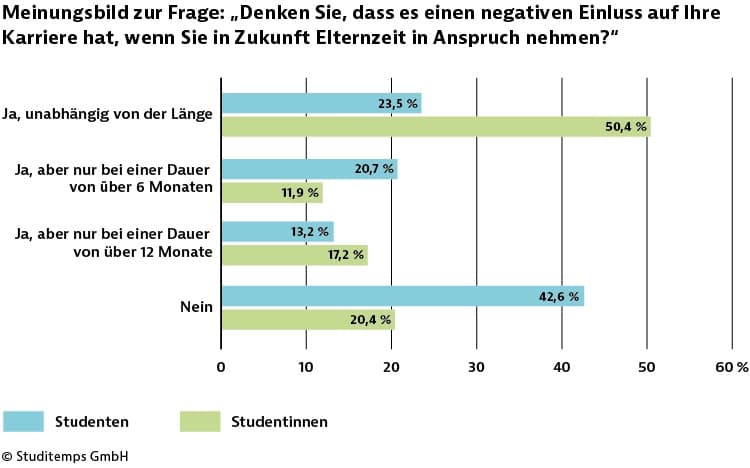Equal opportunities and equal rights for women in society, culture, politics and business have long been on the agenda, particularly with the emergence of calls for a women's quota in the 1980s. While a desirable goal in theory, in reality, women’s quotas are a topic often surrounded in controversy and notoriously hard to implement. Women also tend to bear the brunt of taking parental leave, with many experiencing it as a hindrance to their career, at least after taking it.
How did we end up in a situation where legal requirements and entitlements, which were created to put an end to gender discrimination, end up fuelling concerns about negative effects and lead to discussions about gender roles? We partnered up with Maastricht University to ascertain student views on the topic of mandatory women's quotas, parental leave and careers. This special report was featured in the 18th edition of the Fachkraft 2030 series. Around 12,000 students throughout Germany were surveyed in March and April 2021. Let’s dive in with a look at how things currently stand.
Do women's quotas even play a role in the private sector?
Currently, the share of women in leading positions in companies covered by the quota regulation is 35.4 percent - compared to a mere 25 percent in 2015. In supervisory boards without this regulation, women only hold 19.9 percent of the available positions. It's also worth noting that the number of women in leadership positions at the over 100 companies that fall under the fixed gender quota for supervisory boards has risen significantly quicker and higher than in the companies only required to set voluntary targets. As it would seem, legal bills, i.e. the purported end goal, tend to achieve more than voluntary quotas based on common consensus. But are men scared of the quota?
‘I consider the underrepresentation of women on management boards to be a serious issue. As an executive and firm opponent of all forms of discrimination, I have consequently ensured that our jobs are awarded solely on the basis of merit for years. The demographic shift has flipped the table. Now, we face a new generation of leaders to whom discrimination is just as foreign as to me and my colleagues at jobvalley. We are already doing our bit to support this generation with smart matching algorithms that have revolutionised the way employees are selected without any prejudices, based purely on objective guiding principles. I am unable to conclusively say whether a women's quota is the best solution during the transitional phase we find ourselves in. However, fighting discrimination with discrimination seems questionable to say the least.’
– Tim W. (Vice President Product at jobvalley)
Women are still woefully underrepresented in top management positions among executive and supervisory boards at German companies. On 25 June 2021, the Bundesrat ratified the Second Act on Equal Participation of Men and Women in Management Positions (Zweites Führungspositionen-Gesetz - FüPoG II). An increased effort must now be made to include women in management positions in large companies when vacancies arise (applicable to listed firms and companies subject to equal co-determination with over 2,000 employees and an executive board consisting of more than 3 members).
‘I don’t view a set quota as the way to make progress. Instead, we need to change the mindset. That being said, a “quota” represents a crucial first step in the right direction.’
– Hana B. (Vice President of Finance Operations at jobvalley)
Parental leave – a career killer for men as well as women?
Another major issue that keeps popping up in relation to equal opportunities and potential discrimination at work is parental leave. Since 2015, both parents are entitled to flexibly take up to three years of parental leave at the same time. Consent from their employer is not required. According to the Federal Statistical Office, the number of parents taking parental leave increased by around one third between 2009 and 2019. However: To this day, only an extremely small percentage of fathers tend to take parental leave. In 2019, almost a quarter of all mothers whose youngest child is under 6 years old were on parental leave. Among fathers, this figure was only 1.6%. For children under 3, 42.2% of mothers and 2.6% of fathers were on parental leave.
Do women really believe taking parental leave will hurt their career? And why do so many more mothers take maternity leave than fathers? Are women simply falling back into their traditional roles?
‘I wasn’t worried about re-establishing myself professionally at any stage, in fact, I was already offered a new opportunity to improve my career before and during my parental leave.’
– Hana B. (Vice President of Finance Operations at jobvalley)
While the fact may remain that only a small percentage of fathers take the opportunity to build the parent-child bond at an early stage and take a break from work, change is on the horizon. In 2020, approximately 462,300 fathers reportedly received their parental allowance, and one in four parental allowance recipients was male (25 percent). This figure marks an improvement on the 21 percent of fathers to receive parental allowance in 2015. That being said, fathers continue to take significantly shorter parental leave than mothers.
‘I was lucky to enjoy quality time with my son during my parental leave without any need to worry about negative implications or the fact that I’ll be going back on leave soon. In this day and age, I think a company would ward off a lot of young professionals if it were to make parental leave a negative experience for its employees. As a result, I’m very confident that things will continue to follow this positive trend into the future. Anyone who finds themself in a conundrum between taking parental leave or furthering their career may be well advised to seriously consider switching employers once they return from parental leave. You’d be surprised just how much this can help your career!’
– Tim W. (Vice President Product at jobvalley)
What do our students have to say on these issues?

The majority of students support a mandatory quota for women represented on supervisory/executive boards (M 60.4 percent/W 77.9 percent), holding political office/mandates (M 61.6 percent/W 76.4 percent), and acting as professors (M 58.2 percent/W 72.4 percent).
‘The fact that women are increasingly facing less barriers when it comes to securing a job raises the question of whether we need a women's quota at all. While a nice idea in principle, I personally wouldn’t feel comfortable not knowing whether I was hired based on merit or my ability to meet a quota. I find it a shame that we still require legislation to get the point across that a woman can be just as qualified to do a job as a man.’ – Pia G. (Business administration student)

57 percent of male students and almost 80 percent of female students believe that taking parental leave will have a negative impact on their career. Over half the female respondents worried about negative implications, regardless of how long they took off for parental leave – only 23.5 percent of male respondents share this concern.
‘Even though that phase still feels a long way off, you nevertheless sometimes find yourself wondering how things would be if you had kids. In my field of study, business, a lot of students aim to go on to enjoy a successful career. However, when you add kids into the mix, it can seem like a good idea to try and achieve as much as possible as early as possible due to your focus being on an entirely different goal when you're on parental leave. That being said, in an ideal world, I think every company should allow new mums and dads alike to take time off to care for their child without needing to worry about any negative implications. Thanks to technological advancements in recent years, working from home has been around a while. It has also paved the way for parents to take less time off on parental leave and continue working from home, allowing them to tackle any concerns or obstacles they face with compromises.’ – Pia G. (Business administration student)
Summary
In general, students appear to have embraced the new, open-minded approach of their generation. A generation with members that no longer worry about any negative consequences due to simply lacking experience and others that view parental leave as an entirely routine event without any concerns about how it could negatively impact their career. Others (male students) simply expect to take less parental leave when the time comes (or none at all), so it won’t play any role in their career. Either way, it would appear this is mirrored in the way things stand at present. We are in the midst of a social revolution to break down traditional gender roles, both with mandatory requirements such as women's quotas and expanding parental leave to allow men to enjoy bonding with their child.


